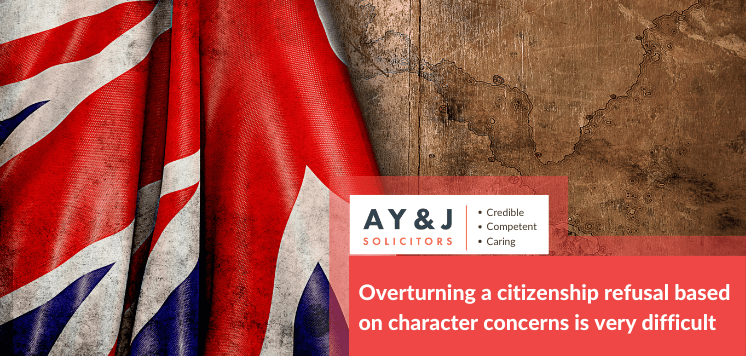Disclaimer: The information in this blog is accurate as of its publication date. Any updates after that date are not reflected here.
In a citizenship application, the Secretary of State for the Home Department decides whether the applicant is a person of good character or not based on an individual’s circumstances and personal history. If an application is refused on basis of the Secretary of State for the Home Department’s concerns regarding someone’s character, it is likely to be very difficult to overturn the decisions in the courts according to the Court of Appeal’s recent decision in R (Amin) v Secretary of State for the Home Department [2022] EWCA Civ 439.
Summary of facts
This appeal concerns the Secretary of State for the Home Department’s refusal to grant an application by the appellant Mr Ali Tawfik Mohammed Amin who is a citizen of Iraq born on 1 June 1978. He came to the United Kingdom on 20 October 2002. He was initially granted Exceptional Leave to Remain and subsequently granted Indefinite Leave to Remain. He initially made an application for naturalisation as a British citizen in 2013 which was refused in 2013 as committed motoring offences in 2012 and 2013. He made an application again for naturalisation on 9 May 2017 and the said application was refused on 14 January 2019. The Secretary of State for the Home Department refused the appellant’s application because she was not satisfied that the appellant is of good character as required by paragraph 1(b) of Schedule 1 of the British Nationality Act 1981. The main reason behind the Secretary of State for the Home Department’s decision is that the appellant is not a person of good character because his family has been friends with Ansar al Islam’s leader Mullah Krekar’s family since the 1970s. The appellant’s father and Mullah Krekar’s brother had been to school together. Also, their family members got married to each other’s families including the appellant’s aunt who was married to Mullah Krekar’s brother in 1998. The appellant visited Mullah Krekar in Norway in August and November 2004. And during the November trip, he got married to Mullah Krekar’s daughter. The couple later got divorced. He also lived with the members of Ansar al Islam in London in 2005. No criminal charges were ever brought against him.
Ansar al Islam is “regarded as a group with extremist views” by the Secretary of State for the Home Department. The Secretary of State for the Home Department considered that the appellant was not of good character and refuse his application to naturalise as a British citizen due to his association with Mullah Krekar and other members of Ansar al Islam, in particular, the Secretary of State for the Home Department was not satisfied that the appellant can mee the statutory requirement to be good character due to his association with known members of the Ansar al Islam and his relationship with Mullah Krekar and was well known for his extremist views when he chose to travel from to Norway to visit him and his family. The Secretary of State was in the view that there is no reason to assume that the appellant was unaware of Mullah Krekar’s and other members of Ansar al Islam’s extremist views. However, it was argued by the appellant that the decision to refuse his application for British citizenship was unlawful as the Home Office had failed to consider the facts that he did not know, care about or share Mullah Krekar’s political views. Further, He remarried, and he had no reason to contact his ex-wife who is Mullah Krekar’s daughter. He was no longer associated with any members of Ansar al Islam. By the time he made the second application, 14 years had passed, and his life had moved on. He further argued that it was irrational to look at his past associations rather than his life at the time of the application and to assume that he shared the views of Mullah Krekar and the other people he was associated with in 2005.
The decision of the Court of Appeal
The Court of Appeal considered all relevant matters and decided that the Secretary of the State for the Home Department’s decision was not irrational. In particular, in paragraph 27 of the decision the Court of Appeal held:
There is no fixed or set period after which earlier associations should be disregarded in deciding whether a person is of good character. The guidance does not set any fixed period. Nor, realistically, can there be any such fixed period. Whether such associations should be disregarded will be a question of fact in each case. The question will often be whether or not the applicant may continue to share, or approve of, the extremist views of those with whom he has been associating in the past.
It was further held in paragraph 28,
In the present case, the respondent did address the passage of time since the association with the Krekar family and the others came to an end in her letter of 22 February 2021. First, she considered that the cessation of contact was not the result of the free choice of Mr Amin or any change of view on his part. Rather, the association between Mr Amin and Mullah Krekar ceased on the breakdown of his marriage with Mullah Krekar’s daughter. Contact with the other individuals would have been difficult because of the restrictions imposed by the control orders. Secondly, she would expect a greater number of years to have passed before it was appropriate to disregard associations with members of extremist groups or others holding extremist view. Finally, she took account of the absence of positive evidence that Mr Amin had moderated the views that the respondent inferred he shared with those with whom he had been associating. The respondent, therefore, did not consider that she should disregard the earlier associations and took them into account. The respondent was entitled to make that assessment of the significance of the passage of time in the circumstances of the present case.
Also, in paragraph 32 it was further held,
The evidence is that there were longstanding family connections between Mr Amin’s family and Mullah Krekar’s family with members of one family having married members of the other family. That would inevitably lead in any event to the inference that Mullah Krekar’s views were known to Mr Amin. However, Mr Amin expressly said in his 2007 witness statement that he “was aware” that Mullah Krekar was the leader of Ansar al Islam. It was in that context that Mr Amin initiated contacted with Mullah Krekar and visited him in Norway in 2004 before any question of marriage with his daughter arose.
According to the Sectary of State for the Home Department, there was also an absence of positive evidence that the appellant had moderated his views despite the appellant’s position that he never held the extremist view in the first place. However, at paragraph 34 it was held by the Court of Appeal that “the respondent was entitled to conclude that he shared accommodation, and aspects of his personal life with persons with extremist views. She was entitled to infer that he knew of, and shared, those views.” It was further held by the Court of Appeal in paragraph 36 that “the respondent was entitled to have regard to the relationship between Mr Amin and Mullah Krekar, and his relationship with other persons who were members of an extremist group or who had extremist views. She was entitled to take the view that Mr Amin knew of those views and there was no evidence that he did not share those views. There is no evidence that he had changed or moderated his views over time.” In summary, the Court of Appeal held that the Home Office was entitled to make the assessments about the appellant, and it was not irrational. The court also held that the appellant’s subsequent marriage had been taken into account. The judges also noted that his views “may have remained substantially the same”, notwithstanding marriage and family and the guidance was correctly applied.
Comments on the judgement:
At the starting point it will best quote paragraph 25 of R (Amin) v Secretary of State for the Home Department [2022] EWCA Civ 439:
By way of preliminary observation, the context is that the respondent is considering an application for naturalisation as a British citizen. Before she can grant such an application, she must be satisfied that certain statutory requirements are met. Here, the relevant one is that she is satisfied that the applicant is of good character. If she is not satisfied of that, she must refuse the application. The question of whether the respondent is satisfied that the applicant is a person of good character, such that he should be regarded as eligible for the grant of British citizenship, necessarily involves an evaluation or judgment on the part of the Secretary of State. Parliament has assigned that judgment to the Secretary of State. Unless her decision is irrational, or exhibits some relevant failure to observe public law principles, the decision as to whether she is satisfied that the person is of good character in this context is a matter for the Secretary of State. Further, it is for the applicant to satisfy the Secretary of State that he is of good character; it is not for the Secretary of State to prove that he is not of good character.
In the light of the decision in R (Amin) v Secretary of State for the Home Department [2022] EWCA Civ 439, it is likely to be very difficult to overturn a decision that a person is not of good character if the applicable guidance has been followed, and detailed reasons are provided in the decision letter; it would be very difficult to demonstrate that such a decision is irrational. It is clear from this case that a lack of criminal convictions is not enough to be considered a person is of good character. If an applicant would like to contradict the Secretary of State for the Home Department’s assessment, positive evidence of good character must be provided; merely arguing that ‘passage of time’ or ‘change of circumstances’ may not be sufficient in such cases.
A Y & J Solicitors can help you with bespoke immigration services, including applications for naturalisation, including challenging the refusal decisions by way of reconsideration and Judicial Reviews.









